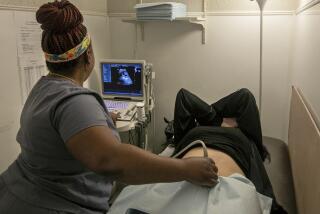Tests to Help Spot Down’s Syndrome in Fetuses Reported
- Share via
Ultrasound tests can help identify pregnant women who may be carrying Down’s syndrome fetuses and therefore should undergo amniocentesis, the best available prenatal diagnostic tool for the syndrome, a new report published today says.
Doctors generally urge pregnant women 35 or older to undergo amniocentesis, a procedure that carries some risk to the fetus because it involves extracting fluids from the amniotic sac with a needle.
But only about 40% of 5,000 Down’s syndrome cases in the nation are detected this way because most women who have Down’s syndrome children are under 35 or do not have the telltale low blood levels of the protein associated with the syndrome, according to a report in the New England Journal of Medicine.
In the new study involving 5,500 fetuses in the second trimester, researchers found that fetuses with Down’s syndrome appeared more likely to have slightly shorter thigh bones and somewhat thicker skin on the back of their necks.
Looking for such clues, the researchers were able to determine that ultrasound measurements could identify 75% of fetuses that would be born with Down’s syndrome and to correctly diagnose 98% of normal fetuses.
Ultrasound uses sound waves to produce a picture of the fetus in the womb. The test is frequently used to measure the size of the fetus, determine its rate of development and detect twins. Ultrasound, performed far more often than amniocentesis, carries no known risks to the fetus.
The latest research suggests that doctors using ultrasound for such reasons should also check the fetuses for the signs of Down’s syndrome, said Dr. Beryl R. Benacerraf, the chief developer of the approach. And if the physical signs are present, the women should then undergo amniocentesis, the test that is the main way of determining Down’s syndrome, she said.
But ultrasound screening of fetuses for telltale physical signs should not take the place of amniocentesis in diagnosing Down’s syndrome babies, warned Benacerraf, an assistant professor at Harvard Medical School. “I would never ever say that ultrasound would be sufficient to make that diagnosis,” she said in an interview. “I would simply use ultrasound to identify women who are not currently candidates for amniocentesis to have it.”
Editorial Urges Caution
Her caution was seconded by an editorial that accompanied the study in the medical journal. It pointed out that the use of ultrasound to look for signs of Down’s syndrome should still be considered experimental.
“Although this report is intriguing, we urge clinicians to resist the temptation to introduce ultrasound screening for Down’s syndrome into wide practice before these findings are confirmed by others,” wrote Dr. Sherman Elias of the University of Tennessee and attorney George J. Annas of Boston University School of Medicine.
Dr. Aubrey Milunsky, director of Boston University’s Center for Human Genetics, also questioned how many physicians and technicians who perform ultrasound would be able to spot the signs of Down’s syndrome.
“This is a study done by a group who are very good at obstetrical ultrasound,” he said in an interview. “The same standards are not available nationwide by a long shot.”
Down’s syndrome affects one or two of every 100 babies born in the United States.






